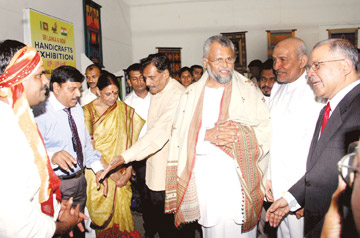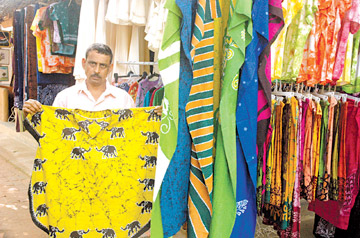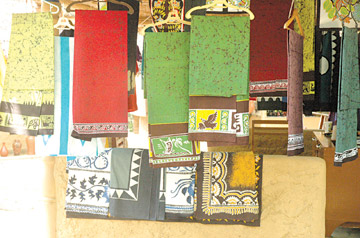|
Manufacturers need support:
High cost of raw materials, a blow to batik industry
By Ananda KANNANGARA
|

Indian High Commissioner Ashok K. Kantha, Traditional Industries
and Small Enterprise Development Minister Douglas Devananda,
Western Province Governor Alavi Moulana and Chairman Handicraft
Association,Buddhi Keerthisena at the Handicrafts Exhibition Pic::
Vipula Amarasinghe
|
During the early part of last century Sri Lankan traditional
craftsmen produced exquisite handicraft. These handicrafts were not only
used by Sri Lankans but also foreigners who had a great regard for them.
In the past local craftsmen used traditional technologies, tools and
indigenous raw materials to create various handicraft items such as
wooden and metal statues, brass and silver items, wood carvings, table
clothes, sarongs, wall hangings, batik paintings and many more items.
Among them, batik became popular among local and foreigners during
the latter part of 1960.
Due to the high demand for batik garments and other items,
industrialists opened small-scale batik workshops in many parts of the
country.
The industry was expanded during 1980's due to the increased demand
for batiks from other countries.
When foreigners visited the country during that period they were in
the habit of visiting batik workshops in Kandy, Anuradhapura, Galle and
Negombo to buy batik items such as frocks, wall hangings, shirts,
sarongs, kaftans and housecoats.
This situation encouraged our batik manufacturers to expand the
industry. As a result, number of batik workshops and showrooms were
opened in many parts of the country.
Even today thousands of batik workshops and showrooms could be seen
at Kadawatha, Yakkala, Imbulgoda, Kandy, Nittambuwa, Kurana, Ja-ela,
Katunayaka, Seeduwa, Negombo, Kalutara, Ambalangoda, Galle, Hikkaduwa,
Beruwala and Matara.

A batik shop |

A batik showroom |
In addition small-scale manufacturers had also opened batik workshops
in rural areas and supplied products to showrooms in Colombo and other
major cities.
The Sunday Observer last week visited number of batik workshops and
showrooms along the Kandy, Negombo and Galle Roads to speak to people in
the industry.
According to some small-scale batik manufacturers, the industry is
gradually deteriorating due to the high cost of raw materials such as
dye, wax and clothes.
The prices of these raw materials in the open market are increased
very often and this situation is unbearable for small-scale batik
manufacturers.
Unlike in the past, today people hardly use batik garments, but
foreign nationals who visit Sri Lanka, especially those from the West
still prefer our batiks.
The industry has a history of over 60 years and it is the
responsibility of authorities to promote it. The authorities could make
arrangements to send our batik products to foreign markets.
During the six-day Sri Lanka-India handicrafts exhibition at the
National Art Gallery on April 5, Minister of Traditional Industries and
Small Enterprise Development, Douglas Devananda said that traditional
industries must be upgraded and his Ministry always encourage local
craftsmen.
He said steps will be taken to develop the batik industry by sending
products to the foreign market, so that the industry will never die.
According to Minister Devananda, batik exhibitions will be held at
main cities in the country and also in other countries in future.
A manager of a batik sales centre, Vinitha Kahadugoda said they have
two batik shops at Imbulgoda and at the Janakala Kendra Complex at
Battaramulla.
She said there was a big demand for batik products from local people
during 1980's, but now the market survives due to the arrival of foreign
buyers.
She said there are three batik sales centres at Janakala Kendra
Crafts village, but some days the daily turn over was very low and it
was even not sufficient to pay the salaries of workers.
She said Sri Lanka Tourism could send foreign tour groups to the
Janakala Kendra Complex on their way to other cities in the country.
She also requested local tour groups to bring tourists to their shops
at the handicrafts village and helped them to develop this industry.
"Like other private batik shops, we are also ready to give them a
commission" she said.
She noted the high cost of raw material that are used to manufacture
batiks and said the Ministry must look into this and provide raw
materials at reasonable prices.
She said when the Government increases the taxes of wax and dye even
by few rupees, the selling prices are increased unexpectedly by traders
in the Pettah market. D. Wasantha of Shirmila Batiks at Koggala in the
Southern Province
said that he owns two batik shops at Koggala and at the Janakala
Kendra Complex, Battaramulla.
He said authorities could develop the industry by adopting various
strategies such as encouraging foreigners to entertain the batik shops
at the Janakala Kendraya.
He also urged the Small Industries Ministry to provide wax and dye to
batik manufacturers at affordable prices.
He also wanted the Ministry to get support from the Tourist Board to
bring tourists regularly to the Janakala Kendra complex.
A batik shop owner, P. A. Costa said that he has been in the industry
for the past few decades and unlike earlier, the batik industry is now
running with less profit.
"If authorities really wants to develop the industry, the prices of
wax and dye should be reduced for the sake of small-scale batik
manufacturers."
He also requested Minister Douglas Devananda to visit the Janakala
Kendra every month and discuss with batik and other handicraft stall
owners about the problems they face.
Gemunu Peris of Sunil Batiks, Marawila said the Ministry attention
towards the handicraft industry was very poor. Minister Devananda should
visit batik and other handicraft shops at major cities very often and
discuss with traders about their grievances.
He said the Minister should organise handicrafts exhibitions at major
cities in the country to encourage traders engaged in the business.
A batik manufacturer, Wijaya Kamal of Kegalle said the Ministry of
Industries help small-scale batik manufacturers to sell their products
at the Bandaranaike International Airport.
|

